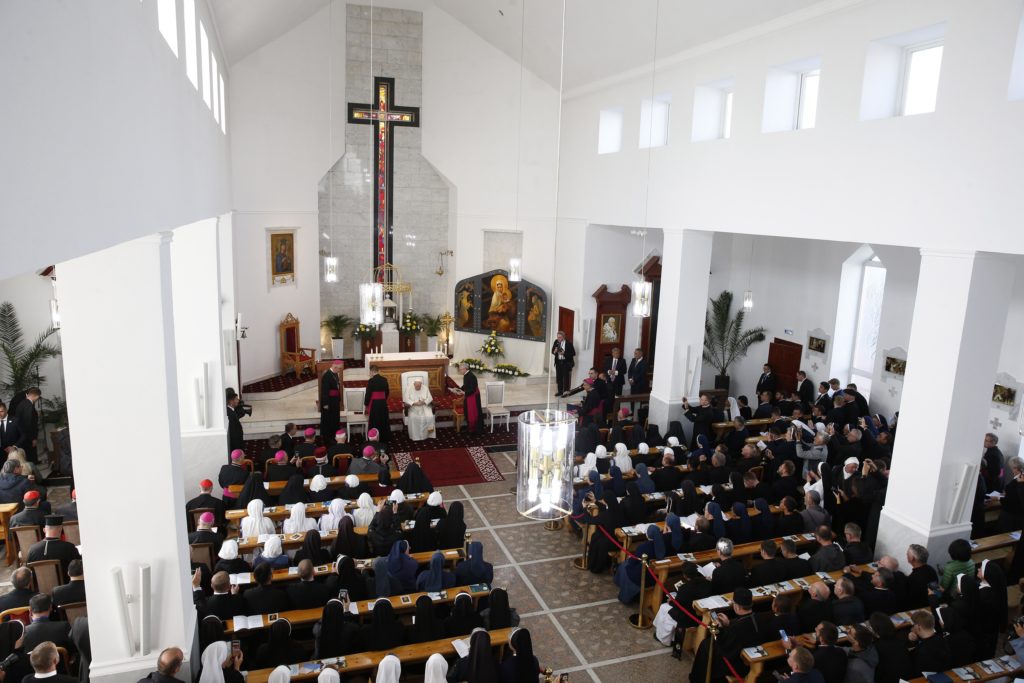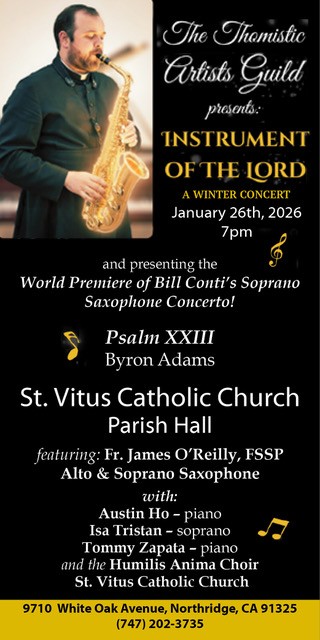The strength of the Catholic Church in Central Asia is measured not in numbers, but by the diversity of its people, Pope Francis said.
"The beauty of the church comes from the fact that we are one family, in which no one is a stranger," the pope said Sept. 15 during a meeting with clergy, religious, lay men and women and seminarians at Our Lady of Perpetual Help Cathedral in Nur-Sultan.
"Let me repeat: In the church, no one is a stranger! We are the one holy people of God, enriched by a multitude of peoples," he said. "The strength of this priestly and holy people lies precisely in its ability to draw richness from this diversity, by sharing with one another who we are and what we have."
The pope was welcomed to the cathedral by a group of men, women and children dressed in traditional Kazakh clothing. Seated in his wheelchair, the pope listened and smiled as the group played traditional music.
As the pope entered the church, a person cried out, "Viva il Papa!" ("Long live the Pope"), prompting those present to repeat the phrase and applaud.
During the meeting, the pope heard the testimonies of three people, including Kazakh Father Ruslan Rakhimberlinov, rector of Mary, Mother of the Church Seminary in the Diocese of Karaganda.
Father Rakhimberlinov said that for him, being a priest means to look "at what happens between God and every single human being and to understand that what happens does not come from you, the minister, that you cannot create it or change it yourself, but instead that you have been given by God only to be present in this divine work and to witness it with awe and reverence," he said.
Speaking on behalf of religious women, Sister Clara, a member of the Community of the Beatitudes, told Pope Francis she was grateful for a vocation which allows her "to spiritually be a mother to every person."
"Every day the Lord teaches me to love and accept my neighbor. I can say that when I was younger, I wanted to do so much for Christ," she said. "Today I ask him to act through me for the sake of others."
Miroslava Galushka, the wife of an Eastern Catholic priest, told the pope she was happy to support her husband's ministry in the country and to share their lives with "the people the Lord has placed along the way."
A native of Ukraine, Galushka also thanked the pope for his "prayers and for all your efforts to restore peace in my homeland."
Pope Francis thanked the speakers for their witness, which served as a reminder that, "in the church, shaped by the Gospel, we learn to pass from selfishness to unconditional love."
"This means going out of ourselves. Each of us constantly needs to do that," he said.
In Kazakhstan, he said, "the vibrant Christian communities and a religious sense coursing through the lives of its people" is due to the rich history of missionaries who spread the Gospel and founded communities, shrines, monasteries and places of worship.
"We need to honor and preserve this Christian and ecumenical heritage, this passing on of the faith, that took place thanks to many ordinary people, to so many grandparents, fathers and mothers," he said.
However, he added, Christians in Central Asia must beware of "getting stuck in the past and letting ourselves be paralyzed and immobile."
"When we do that, we are tempted to take a step backward," the pope said.
Faith, he continued, was not passed down "as a set of ideas to be understood and followed, as a fixed and timeless code" but instead as a witness passed down through life experiences that shed the light of the Gospel "on different situations in order to illumine and purify them."
"Limited numbers of those practicing their faith in a vast country like this may cause some to feel 'little' and inadequate," the pope said. The country has about 125,000 Catholics out of a population of more than 18.7 million people.
"There is a hidden grace in being a small church, a little flock, for instead of showing off our strengths, our numbers, our structures and other things that are humanly important, we can let ourselves be guided by the Lord and humbly draw close to others," the pope said.
He also reminded those present that Christian communities in Central Asia should be not become "places of rigidity and formality, but training grounds in truth, openness and sharing."

